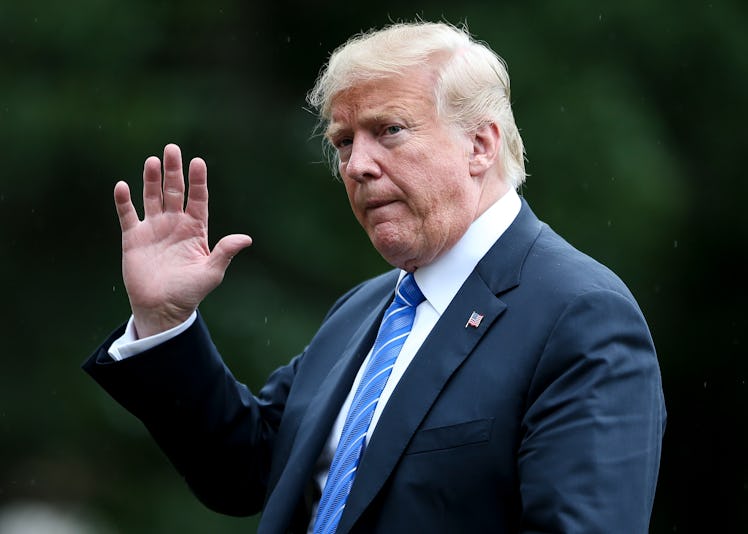
If You Want To Know What Trump's Saying To World Leaders, You May Be Disappointed
President Donald Trump's interactions with international leaders have always been a wild ride, but according to this new report, it's about to be a very silent one. The White House has stopped releasing calls with world leaders, according to CNN, and it's a pretty big shakeup from tradition. So basically, if you want to know what Trump and any of his foreign counterparts are talking about late-night (or whenever), you might be out of luck.
CNN reported on Tuesday July 24 that the White House was no longer sharing public summaries of the president's calls with foreign leaders. The publication noted that in the past two weeks Trump has had two calls with foreign leaders — Israeli Prime Minister Benjamin Netanyahu and Turkish President Recep Tayyip Erdogan — which were reported by foreign press outlets, but the White House hasn't released any information about them. It was not immediately clear if the new policy was temporary or permanent. Elite Daily reached out to the White House for comment on the change, but did not immediately hear back.
Traditionally, presidents on both sides of the aise will release official summaries of their calls with foreign leaders, called "readouts," to give the public a general idea of what the two leaders discussed. While the readouts don't offer much in the way of detailed information, they're a way for an administration to keep people informed (as well as present the diplomatic discussions between the leaders in the best possible light). But it appears the Trump administration may have put the kibosh on that.
Given the president's recent dealings with world leaders, it's maybe not surprising — though still alarming — that Trump may not want public input on the way he's been handling America's diplomatic relationships. In June, Trump shocked the world by his behavior at the G7 summit in Canada, where he actively antagonized America's allies, calling the summit's host Canadian Prime Minister Justin Trudeau "dishonest and weak" in a tweet after the event, and reportedly chucking Starburst candies at German Chancellor Angela Merkel. For a final act, on his way out the door Trump withdrew his support for the joint communiqué between the seven nations. And in early July, at the NATO summit in Brussels, Belgium, the president accused Germany of being "captive" to Russia and demanded that the other member nations dramatically increase their spending in the organization.
Meanwhile, Trump has been famously friendly with leaders he really shouldn't be, such as Russian President Vladimir Putin. On July 16, he appeared to support Putin's denial that Russia had meddled in the 2016 U.S. presidential election, even though the U.S. intelligence community is in agreement that Russia totally did.
Perhaps even more relevant, back in March the two presidents had a notorious phone call in which Trump congratulated Putin on his recent electoral victory in the country's presidential race. The problem? Putin's victory was super sketchy, with videos of ballot-box stuffing and "statistical anomalies" in which the number of votes cast doesn't make sense, per The Guardian.
Despite the fact that Trump had been instructed not to congratulate Putin on his call — literally, the notes his aides prepared for him had "DO NOT CONGRATULATE" written in all-caps — Trump went ahead and congratulated Putin anyway. The whole thing got him in hot water in that highest of public courts, Twitter.
So basically, it makes sense that Trump may not want the public listening in on his diplomatic chats any more. But unlike eavesdropping on your siblings' conversations when you were a kid, the American public should have a right to know what the president is discussing in terms of international affairs. It's a shame there's no way for the public to just quietly pick up the extension in the kitchen and listen in.